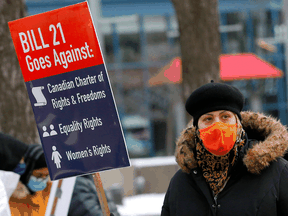The charter that defends rights, but also tells government how to quash them
Not everyone is inclined to cheer the charter as a bulwark of liberty. ‘We are less free today than 40 years ago,”’ said John Carpay, president of the JCCF Author of the article: Tristin Hopper Publishing date: Apr 15, 2022 • April 15, 2022 • 7 minute read • 91 Comments


The decision was a surprise to Canadians, where any number of similar challenges had failed.
Time after time during the COVID-19 pandemic, Canadian governments imposed extraordinary public health measures that seemed to be naked infringements on Canadians’ charter rights. Mandated church closures that violated protections on “freedom of religion.” Bans on gatherings that curbed “freedom of association.” Border and travel strictures that undermined charter guarantees on mobility rights.
But the courts didn’t care. Whenever a pandemic case hit the docket, courts “erred too far on the side of deferring to government,” Joanna Baron, the executive director of the Canadian Constitution Foundation, told the National Post.
Sunday marks the 40th anniversary of Canada repatriating its constitution, a process that included passage of the Charter of Rights and Freedoms. The charter has often been praised as one of Canada’s leading modern accomplishments and its “gift to the world.” But it’s also one of the world’s only constitutions that explicitly gives the state a roadmap on how to quash the very “fundamental freedoms” it cites. It’s why, four decades in, not everyone is inclined to cheer it as a bulwark of liberty.
“I cannot think of any freedom … that the charter has brought to us,” said John Carpay, president of the Justice Centre for Constitutional Freedoms, a group that has been particularly active in challenging pandemic mandates and defending the organizers of Freedom Convoy. “We are less free today than 40 years ago,” he said.
If governments are looking to do an end-run around charter-enumerated rights, there are two primary sections of the document they turn to. Section 1, which is literally the first line of text in the charter, explicitly states that rights and freedoms are protected in Canada only to “reasonable limits.”
According to an official government of Canada guide to the charter, the purpose of this section is to remind Canadians that “rights can be limited by law so long as those limits can be shown to be reasonable in a free and democratic society.”
The notwithstanding clause allows provincial governments to knowingly pass legislation that treads on a fundamental freedom.
If such a legislative override had existed in the U.S. Constitution, many of the most iconic Supreme Court decisions of the civil rights movement might not have mattered. Brown vs. Board of Education — the 1954 decision that struck down school segregation — could simply have been ignored by states invoking the notwithstanding clause.
In Quebec, it’s how provincial governments can consistently maintain legislation that are a pretty obvious curb on fundamental freedoms. Bill 21, a provincial law passed in 2019, bars government employment to any Quebecer who wears religious garb such as turbans or hijabs. Any charter challenge against Bill 21 would likely be a slam dunk on the “freedom of religion” clause, but Quebec would simply be able to soldier on with the law by invoking the notwithstanding clause.
